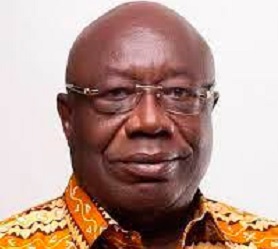The Minister of Environment, Science, Technology and Innovation (MESTI), Dr Kwaku Afriyie, has called for a collective action involving state and non-state actors to deal with plastic pollution in the country.
He observed that given the dire consequences plastic pollution had on the environment and human health, it was important for all individuals and institutions to work hand in gloves to curb the menace.
In a statement issued to mark this year's World Environment Day (WED), the minister underscored the need for all stakeholders in the waste management sector to work together to stop single-use plastics in the country.
"The major problem confronting Ghana is the collection of single-use plastics or the under 20 microns plastics termed as the orphan plastics, and the improper disposal of such plastics.
"Let us use this day as a catalyst for social change to collectively beat plastics pollution in Ghana by rejecting single-use or orphaned plastics and chart a path to a cleaner, healthier and sustainable environment for both ourselves and for posterity," he stressed.
The minister added that dealing decisively with the plastic menace would require metropolitan, municipal and district assemblies (MMDAs), ministries, departments and agencies (MDAs) and other partners to unite in playing effective roles towards managing plastic wastes to protect the environment and achieve greener and better lifestyles.
World Environment Day
The United Nations (UN) declared June 5 every year as the WED to drum home the need for member countries to take proactive steps to curb crimes against the environment.
The day serves as the largest global platform for environmental outreaches meant to promote public awareness and actions on environmental issues.
This year marks the 50th anniversary of the event and will be hosted by Cote d'lvoire, in partnership with the Netherlands.
The objective of the celebration is to create regular public awareness and education on emerging environmental issues, serve as a powerful platform to accelerate, amplify and engage people, communities and governments around the world, and stimulate action on critical environmental challenges facing the planet.
This year's WED is being held on the theme: “Solutions to plastic pollution” with the slogan, “beatplasticpollution” with the focus to ramp up efforts towards dealing with the plastic menace.
Collaboration
In line with the theme, Dr Afriyie said there was the need for collaboration between governments, private sector organisations and individuals to effectively provide long-lasting solutions to combat the threats posed by plastic pollution on both human health and the environment.
Dr Afriyie said for the government, observing the WED was an opportunity for renewed commitment "to beat plastic pollution and provide solutions to plastic pollution."
He assured Ghanaians that the government would ramp up policies and interventions that would help to reduce the plastic menace in the country.
In that regard, he said MESTI would work with other stakeholders, particularly the Environmental Protection Agency (EPA), to undertake projects that would promote sustainable management of plastics.
He said the focus of such projects would be to ensure "edible and compostable packaging as a sustainable alternative to single-use plastics."
Dr Afriyie added that through effective collaboration with key stakeholders, MESTI would engage and assign public and private collectors to collect and store plastic wastes, as well as promote domestic recycling.
The minister said public education on proper waste disposal and segregation practices would be intensified to engender behavioural change towards the use and disposal of plastics.
He reiterated the need for all citizens to undertake clean-up exercises and adopt measures to reduce, reuse, recycle and recover their waste.
Background
Plastic pollution remains a major environmental concern because of the severe threat it poses to both terrestrial and marine ecosystems.
Globally, 8 million tonnes of plastic waste leaks into the ocean each year.
According to the United Nations Environment Programme (UNEP), the equivalent of one garbage truck of plastic is dumped into the ocean every minute across the world.
It is estimated that by 2050 there would be more plastic than fish in the ocean, if urgent collective action was not taken to tackle the menace head-on.
The UNEP warns that plastic pollution can alter habitats and natural processes, reducing ecosystems’ ability to adapt to climate change, directly affecting millions of people’s livelihoods, food production capabilities and social well-being.
Despite these threats, in Ghana, the annual imports of raw plastic materials are estimated to be 2.58 million tonnes, with about 73 per cent of the total plastic imports ending up as waste materials.
About 840,000 tonnes of plastic waste is generated annually in the country, while just 9.5 per cent of that is collected for recycling.
The system of waste pickers operates “below the radar” without formalised standards and processes.
This puts stakeholders throughout the value chain at risk and also limits the way in which larger institutions can engage.

